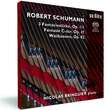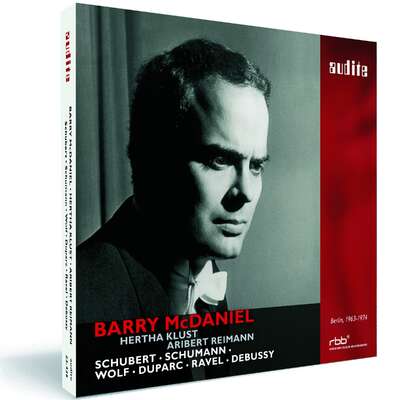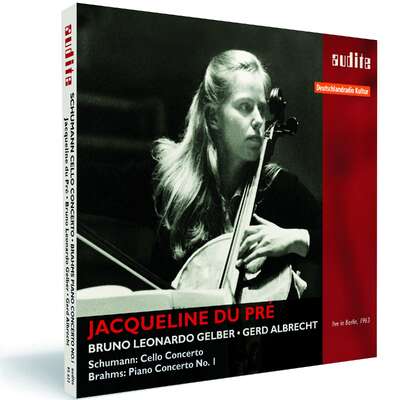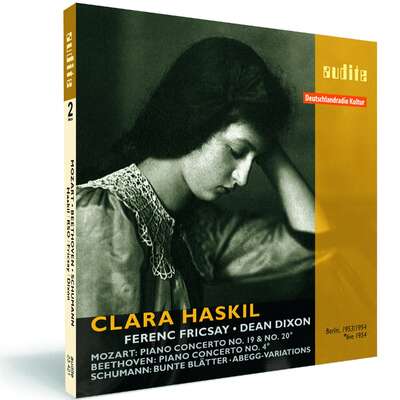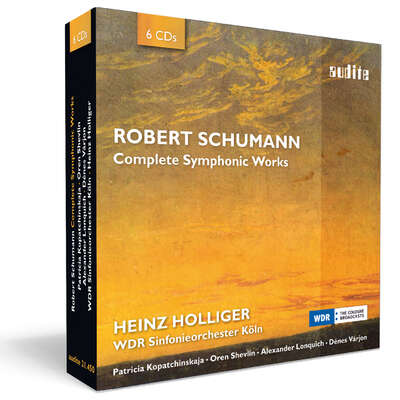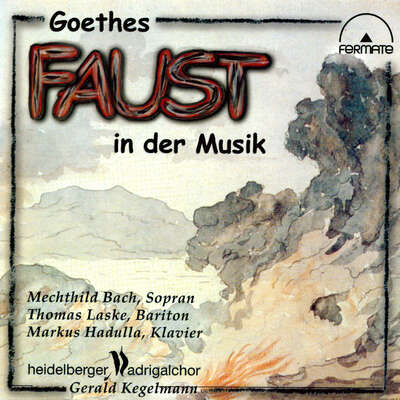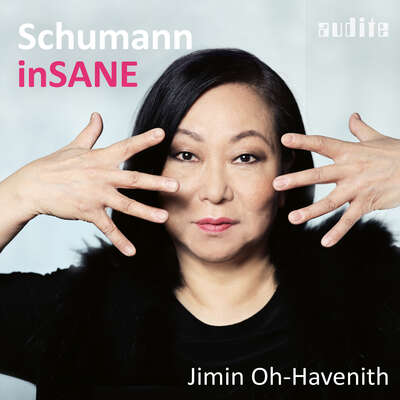
The Fantasy in C major, Op. 17 was composed during a period of great desperation and longing for the unattainable Clara Wieck. It has been often designated as Schumann’s most successful piano work, contrasting the principle of the free rhapsody with the tightly-knit sonata form. The ...more
"En ce sens, Nicolas Bringuier ne manque ni de tension ni de sensibilité: le spectre des sentiments et des humeurs revêt sous ses doigts, une diversité de teintes et de nuances vraiment convaincante. L'instinct est sûr et le talent à suivre." (www.classiquenews.com)
Details
| Robert Schumann: Fantasie C-Dur, Waldszenen, 3 Fantasiestücke | |
| article number: | 92.563 |
|---|---|
| EAN barcode: | 4022143925633 |
| price group: | ACX |
| release date: | 28. March 2007 |
| total time: | 60 min. |
Informationen
The Fantasy in C major, Op. 17 was composed during a period of great desperation and longing for the unattainable Clara Wieck. It has been often designated as Schumann’s most successful piano work, contrasting the principle of the free rhapsody with the tightly-knit sonata form.
The “Forest Scenes,” Op. 82 are nine miniatures related to the enchanted world of the “Scenes from Childhood.” They are programmatically designed and marked by a folkloristic tone. Outstanding amongst them is the scene entitled “The Bird as Prophet,” in which the song of the bird is naturalistically imitated.
The Three Fantasy Pieces, Op. 111, originally entitled Romances, form a cycle, bringing this recording to a “powerful and very marked” close.
Nicolas Bringuier delves into the music with analytical awareness, technical perfection and clarity in sound, forming it with a lyrically breathing manner, musical impulses and emotional expression. The combination of structure and analysis with expression and emotion enables the listener to find a profound way of access into the music.
Nicolas Bringuier has won prizes at international competitions, including Second Prize and the Silver Medal at the Fourteenth International Robert Schumann Piano Competition in Zwickau in 2004. He makes regular guest appearances as soloist in chamber and orchestral concerts in France and throughout Europe. Nicolas Bringuier made his debut at the Salle Gaveau in Paris in November 2006.
Reviews
klassik.com | April 2008 | Dr. Rainhard Wiesinger | April 1, 2008 | source: http://magazin.k... Nur technisch bewältigt
Der 1980 in Nizza geborene und mittlerweile international tätige PianistMehr lesen
Pforzheimer Zeitung | 1. März 2008 | Thomas Weiss | March 1, 2008 Viel Sinn für Zwischentöne
Nicolas Bringuier hat Sinn für die Poesie Robert Schumanns, die vielenMehr lesen
Fanfare | Issue 31:2 (Nov/Dec 2007) | Steven E. Ritter | November 1, 2007
I am considered somewhat strange among my musical friends for my predilection for Schumann’s music over that of Brahms. While I love Brahms’sMehr lesen
We seem to be living in something of a golden age for Schumann. Almost every new pianist on the horizon is releasing albums of his music, and there are almost more riches to be mined than you can keep up with. Andsnes, Lupu, and Hamelin are just a few who have created significant recordings in the last few years that set very high standards that easily compete with the likes of past masters, such as Horowitz, Wild, Kempff, and Richter. Now Audite, already becoming widely known for stunning SACD recordings, has released this all-Schumann disc by a pianist I have never encountered, 27-year-old Nice native Nicolas Bringuier, in that same format that features some stunningly great surround sound. There are some who believe that a piano recording doesn’t benefit by surround sound. I would point them to this recording to prove them absolutely wrong.
Schumann composed the vast bulk of his piano music between the years 1830 and 1839, not surprising for a young man who still was intent on a career as a concert pianist. Only one work on this disc hails from that time period, the great (some would say his greatest) Fantasy. The work is reflective of the turbulent and upside down life he was living in 1838–1839, desperately trying to win Clara’s hand despite the machinations and fervent opposition of her father. Schumann considered this work the most passionate thing he had ever written, and its beauties are many and sublime, hinting at the last remains of sonata form, yet a full-flown fantasy in every sense of the word. The third movement is now legendary for its magnificent and moving passion, and Mr. Bringuier displays an aptness for this music far beyond his young years. But then again, it was written by a young man experiencing the same thing, so why should this astound us?
The Waldszenen is not played or recorded as much as the other music, and I for one have never understood this, as it is one of my personal favorites. Perhaps it has something to do with Schumann’s return to a simpler, more direct and literary style present in the Kinderszenen. These miniatures are simpler in design and concentrated in emotional content, and some might view this as a backward step after the chaotic world of the Fantasy. But that would be a great mistake, as some of Schumann’s most poetic and intimate thoughts are poured into this work, one that replays according to the attention given. Bringuier is able to shift gears easily, and enter fully into this dream world with a delicate and easy touch.
The three quirky op. 111 Fantasy Pieces are the latest works here, originally conceived as romances. They are supercharged cells of ardent strength, Chopinesque in flavor, and rhapsodic in nature. Bringuier again shifts gears to accommodate this most virtuosic of playing, never once sacrificing integrity of concept and beauty of tone. As mentioned, the sound is fantastic, and I find myself challenged once again by a late comer to Want List consideration. This is a great disc.
Fanfare | November 2007 | Steven E. Ritter | October 31, 2007
We seem to be in the middle of a Schumann fest as of late, and that is a good thing to me. The folks at Audite have openly stated that they don’tMehr lesen
Fono Forum | 10/2007 | Michael Stenger | October 1, 2007 Zu unpersönlich
Der 1980 geborene Nicolas Bringuier, schon früh geschult am Pariser Conservatoire und auch mit Preisen gesegnet, bleibt bei seinem flotten, betontMehr lesen
Bayern 4 Klassik – CD-aktuell | 12.09.2007, 18h20 | Wolf Loeckle | September 12, 2007
Es gibt ihn aktuell stärker ausgeprägt als je zuvor in dieser sich so rational gebenden Zeit, den romantischen Habitus. Der uns neuerlich undMehr lesen
[MUSIK Robert Schumann/Waldszenen/Eintritt]
Nicolas Bringuier spielt Schumann – auf einer Super-Audio-CD des Hauses audite. Vertreten sind Schumanns drei Fantasiestücke Opus 111, die Fantasie Opus 17 sowie die Waldszenen Opus 82. Aus diesem, den Musikbetrieb eher selten schmückenden, Zyklus war gerade das eröffnende Stück mit dem verheißungsvollen Titel Eintritt zu hören. Und wer Augen hat zu hören oder Ohren, die sehen können, dem fällt bei diesen Klängen nicht zuerst der Agitprop einer Autoverhinderungslobby oder die sauere Militanz gegen den saueren Regen ein. Gewiss, ohne den Aktionismus solcher Kreise sähe die Umweltbilanz der Bundesrepublik Deutschland deutlich anders aus. Solche Gedanken waren in Schumanns Zeitalter noch nicht zeitgemäß. So um die Jahreswende 1848/1849 komponierte Schumann neun Miniaturen. Die erinnern in ihrer zyklischen Anlage an die Kinderszenen, in ihrer musikalischen Brisanz an Schumann alleine.
[MUSIK Robert Schumann/Waldszenen/Vogel als Prophet]
Vogel als Prophet – die Nummer sieben der neun als Waldszenen titulierten Miniaturen von Robert Schumann, gespielt von Nicolas Bringuier. Der ist in Nizza 1980 geboren. Er studierte in Paris und Berlin, eine prägende Vorbildpersönlichkeit in seiner Entwicklung ist Oleg Maisenberg. Nicolas Bringuier findet einen sehr eigenen Tonfall im Enträtseln der Schumann´schen Geheimnisse, beim Ausloten der Seelendimensionen dessen, was Schumann ja nicht nur gedacht und erdacht hat. Sondern auch gelebt, durchlebt, durchlitten hat. Da gibt es bekanntlich verschiedene Möglichkeiten, solche Bandbreiten darzustellen. Mancher bleibt im Kitsch stecken, manch anderer verzehrt sich in sentiment pure. Der junge Franzose orientiert sich an der Klarheit der Materialien, aus denen sein japanischer Flügel gefertigt ist und verzichtet folglich auf redundante ritardandi und rubati, auf donnerndes Getöse und sentimentales Geschwurbel. Und das bekommt Schumann entgegen aller Erwartung gut, diese in objektivierende Neutralität zielende Haltung, die sich im Dienst an der Musik und auf dem Umweg über das Klavier „als Sprachrohr der Seele“ versteht.
[MUSIK Robert Schumann/Fantasiestücke Opus 111/ Sehr rasch, mit leidenschaftlichem Vortrag]
Sehr rasch, mit leidenschaftlichem Vortrag ist das erste der drei Fantasiestücke Opus 111 überschrieben. Gewiss lässt sich hier ein titanengleiches hämmern in die Tastatur denken – da und dort wird es ja auch praktiziert. Diese feine, die noble Art, in der Nicolas Bringuier hier Chiffren analysiert, sie auseinaderdividiert und neu zusammensetzt, lässt eine ungewohnte Schumann-Erfahrung erleben. Eine, die tatsächlich überzeugt.
[MUSIK Robert Schumann/Fantasie opus 17/ Durchaus fantastisch und leidenschaftlich vorzutragen]
Über diesem Satz steht Durchaus fantastisch und leidenschaftlich vorzutragen. Nicolas Bringuier löst das auf seine, den eingeschliffenen Erwartungshaltungen kontrastierende, Art ein. Und das macht diese sensible, feine, noble Super-Audio-CD aus dem Haus audite so besonders. Die audite-Leute kommen ja bekanntlich als Technik-Fetischisten daher. Dass ihnen das Wesentliche der Musik aber genau so wesentlich ist, lassen sie immer wieder erleben. Das war eben der eröffnende Satz aus der Fantasie Opus 17 von Robert Schumann. 1836 bis 1838 entstanden, fällt sie in Schumanns Leipziger „Klavierjahrzehnt“.
Manch einer tituliert sie als des Komponisten gelungenstes Klavierwerk. Darüber ließe sich trefflich streiten – ohne dass am Ende wahrlich sinnvolles herauskäme. Immerhin lässt sich die Fantasie als freie Variante der Sonate begreifen, rein formal gesehen, in ihrer Dreisätzigkeit, so nach dem Motto, dass das Prinzip des Sonatensatzes quasi symbolisch wirksam wäre. Über den Gehalt der Musik sagt das nichts. Der lässt sich schon eher aus dem literarischen Bezug herauslesen. Friedrich Schlegels Gedicht „Die Gebüsche“ gibt das Leitmotiv:
„Durch alle Töne tönet/
Im bunten Erdentraum/
Ein leiser Ton gezogen/
Für den der heimlich lauscht“.
Mystisches, Mysteriöses wird hier angestoßen. Und vom siebenundzwanzigjährigen Nicolas Bringuier behutsam und sanft und dennoch wie gefordert - leidenschaftlich dargeboten. Als „das Passionierteste, was ich je gemacht“ vom damals ebenfalls siebenundzwanzigjährigen Komponisten bezeichnet, verweist auch dieser literarische Musikbezug gewissermaßen in den Wald, des romantischen Visionärs und deutschen Denkers wichtigste Region. Mit dem Eintritt in eben jenen Wald hatte dieser CD-Tipp begonnen. Mit dem Abschied, der neunten und letzten der Schumann´schen Waldszenen geht er zu Ende.
[MUSIK Robert Schumann/Waldszenen/Abschied]
- - -
auf Internetseite:
Es gibt ihn aktuell stärker ausgeprägt als je zuvor in dieser sich so rational gebenden Zeit, den romantischen Habitus. Der uns neuerlich und durchaus neuerdings nicht nur auf der Kunstbiennale zu Venedig lehrt, mit den Sinnen zu denken und mit dem Hirn zu fühlen, mit den Augen zu hören, mit den Ohren zu sehen. Wer repräsentierte diesen romantischen Geist nachdrücklicher als die romantische Instanz schlechthin, der Sachse aus dem Rheinland, der göttliche Pianist anfänglich, der klare Denker dann, der faire Kritiker, der große Komponist Robert Schumann. Ein mediterraner Mensch aus Nizza hat märchenhafte Miniaturen, passionierte Szenen, emphatische Phantasien aus Robert Schumanns Entdeckerwerkstatt einem japanischen Shigeru Kawai anvertraut, einem Instrument, das sich selbst in die Spitzengruppe internationaler Meisterflügel einordnet. Und neben den Bösendorfern, Steinways, Yamahas dort seine unverwechselbare Stimme selbstbewusst und um Gleichberechtigung buhlend, einklingend einklinkt: Nicolas Bringuier spielt Schumann – auf einer Super-Audio-CD des technikaffinen und Musik-begeisterten Hauses audite.
Bringuier, 1980 an der Cote d´azur geboren, studierte in Paris und Berlin, eine prägende Vorbildpersönlichkeit ins einer Entwicklung ist Oleg Maisenberg. Nicolas Bringuier findet seinen sehr eigenen Tonfall im Enträtseln der Schumann´schen Geheimnisse, beim Ausloten der Seelendimensionen dessen, was Schumann ja nicht nur gedacht und erdacht hat. Sondern auch gelebt, durchlebt, durchlitten hat. Da gibt es bekanntlich verschiendene Möglichkeiten, solche Bandbreiten darzustellen. Mancher bleibt im Kitsch stecken, manch anderer verzehrt sich in sentiment pure. Der junge Franzose orientiert sich an der Klarheit der Materialien, aus denen sein japanischer Flügel gefertigt ist und er verzichtet auf redundante ritardandi und rubati, auf donnerndes Getöse und sentimentales Geschwurbel. Und das bekommt Schumann entgegen aller Erwartung gut, diese in objektivierende Neutralität zielende Haltung, die sich im Dienst an der Musik und auf dem Umweg über das Klavier „als Sprachrohr der Seele“ versteht.
Audiophile Audition | August 2007 | Tom Gibbs | August 28, 2007
Robert Schumann’s brilliant compositions for the piano bridge the periodMehr lesen
www.classicalcdreview.com | July 2007 | R.E.B. | July 1, 2007
French pianist Nicolas Bringuier (b. 1980) makes his recording debut on theMehr lesen
Pizzicato | 6/2007 | Isabelle Trüb | June 1, 2007
Nicolas Bringuier campe un Schumann poétique et délicat au fil de ces pages pour piano seul. La mélodie privilégie souvent les aigus au dépendMehr lesen
Classica-Répertoire | mai 2007 | May 1, 2007
Piano romantique et moderne<br /> <br /> Nicolas Bringuier aborde la Fantaisie op. 17Mehr lesen
Nicolas Bringuier aborde la Fantaisie op. 17
Les Années Laser | Numéro 130, Avril 2007 | April 1, 2007 Audite
Alors que d'autres déclarent forfait, cet éditeur allemand mise sur leMehr lesen
Bayerischer Rundfunk | 19. März 2007 | Helmut Rohm | March 19, 2007
Eine bemerkenswerte Produktion mit Klavierwerken von Robert Schumann ist daMehr lesen
opushd.net - opus haute définition e-magazine | Mars 2007 | Jean-Jacques Millo | March 13, 2007
Avec pertinence, le musicologue Harry Halbreich définit l'univers musicalMehr lesen
Le Monde de la Musique | mars 2007 | Olivier Bellamy | March 1, 2007
Comme Delphine Lizé, Nicolas Bringuier vient de Nice, a travaillé en Allemagne et en revient avec un disque Schumann. De la même façon que LesMehr lesen
Dans la Fantaisie op. 17, Nicolas Bringuier parvient à allier un geste large avec une rapidité de réaction et une agogique souple pour répondre aux sautes d'humeurs schumanniennes. Son jeu puissant porte naturellement le souffle de la musique : le pianiste épouse l'œuvre par l'esprit sans chercher à la dominer par la force. Le feu de la passion sait faire une place à l'expression poétique, lorsque le piano se met à parler et que le virtuose doit cacher tous ses artifices et laisser tomber son masque.
Dans les Scènes de la forêt, Nicolas Bringuier ne résiste pas au plaisir de tout dire. Non pour montrer sa science ou pour prouver quoi que ce soit, mais par ferveur pour le génie schumannien, ses subtilités, ses sens cachés, ses billets secrets. Mais l'intelligence de son jeu n'empêche jamais chaque pièce de s'épanouir et de livrer à l'auditeur la fraîcheur de son éclosion.
Enfin, les Fantasiestücke op. 111 ne se trouvent pas sur les mêmes cimes d'inspiration, mais Bringuier leur donne une hauteur de vue qui élargit leur horizon.
Piano News | 2/2007 - März / April | Anja Renczikowski | March 1, 2007
Robert Schumann scheint ihm am Herzen zu liegen und begleitet den jungenMehr lesen
lexnews.free.fr | Édition Semaine n° 8 | Philippe-Emmanuel Krautter | February 19, 2007
L’œuvre pour piano de Schumann est emblématique du XIX° siècle.Mehr lesen
www.classiquenews.com | jeudi 1 février 2007 | Adrien De Vries | February 1, 2007
Nicolas Bringuier, candidat malheureux au dernier Concours Chopin, trouveMehr lesen
Journal de la Confédération musicale de France | Février 2007 | February 1, 2007
Ce jeune pianiste, né à Nice en 1980, a été l'élève de Bruno RiguttoMehr lesen
Diapason | N° 544 - Fevrier 2007 | Etienne Moreau | February 1, 2007
L'inépuisable musique pour piano de Schumann, dans laquelle il y a toujours quelque chose à dire sans être obligé de chercher à se démarquer àMehr lesen
Fanfare | Steven E. Ritter | November 30, 2006 Want List for Steven E. Ritter
I keep hearing all the hoopla about the troubles the classical recording industry is in, but for the life of me, with 1,500 new releases coming outMehr lesen
But pride of place has to go to one of the finest song cycles of the past two centuries, and a wonderful tribute to a great artist, Peter Lieberson’s Neruda Songs. This gorgeous music affected me deeply, and I can think of no finer memorial to the composer’s wife Lorraine Hunt Lieberson, who sings with unaffected delicacy and a profoundly hopeful spirit.
The discovery of “lost tapes” in Sony’s vaults led to the idea of a recreation of Stravinsky’s Soldier’s Tale, the composer conducting his original 1961 Suite along with the resurfaced 1967 instrumental interludes, freshly overdubbed with Jeremy Iron’s best-ever narration newly translated into English by Jeremy Sams. This is a spectacular recording, surely definitive, even if DG ever decides to reissue the Boston Chamber Players/Sir John Gielgud recording. Robert Craft’s reading of the Symphonies only adds to the desirability of this disc.
Jac van Steen and his Winterthur Orchestra, long accustomed to music of the Second Viennese School, have gone out and recorded the most beautiful disc of music by the three biggies ever. This is the disc to buy if you, or a friend, don’t like these fellows. The Berg songs alone are worth the price of the disc, with the sumptuous sound of three composers who know how to orchestrate beaming through your SACD setup with unparalleled clarity and sweetness. And you have the added pleasure of noting that if this release doesn’t convert you to their music, nothing ever will.
We seem to be in the middle of a Schumann fest as of late, and that is a good thing to me. The folks at Audite have openly stated that they don’t release recordings unless they feel the artist has something new to say, and Nicolas Bringuier certainly does. This is some of the most ingratiating Schumann on the market, and the SACD sound is truly spectacular, vibrant, warm, and a balm to the ears. Even if this duplicates repertoire in your collection, you will want to sample this, and Super Audio nuts like me will feel compelled to purchase it.
To wind up, this last record took me completely by surprise. Having long known of the work of Ricardo Morales of the Philadelphia Orchestra, I had no idea he came from such a richly talented family. Brother Jesús has laid down tracks of the Saint-Saëns and Lalo cello concertos that are intelligent, passionate, technically adept, and thrillingly adventurous. Brother Jaime conducts the Bulgarians who are somehow thinking they are the Berlin Philharmonic, and play accordingly. Centaur captures it all in excellent sound, and the result is a disc of music that I thought had probably run its course. Not so. This one’s a winner all around.
la Terrasse | Novembre 06 | A. Pecqueur | November 1, 2006
Lauréat du dernier Concours Schumann, Nicolas Bringuier a naturellementMehr lesen
